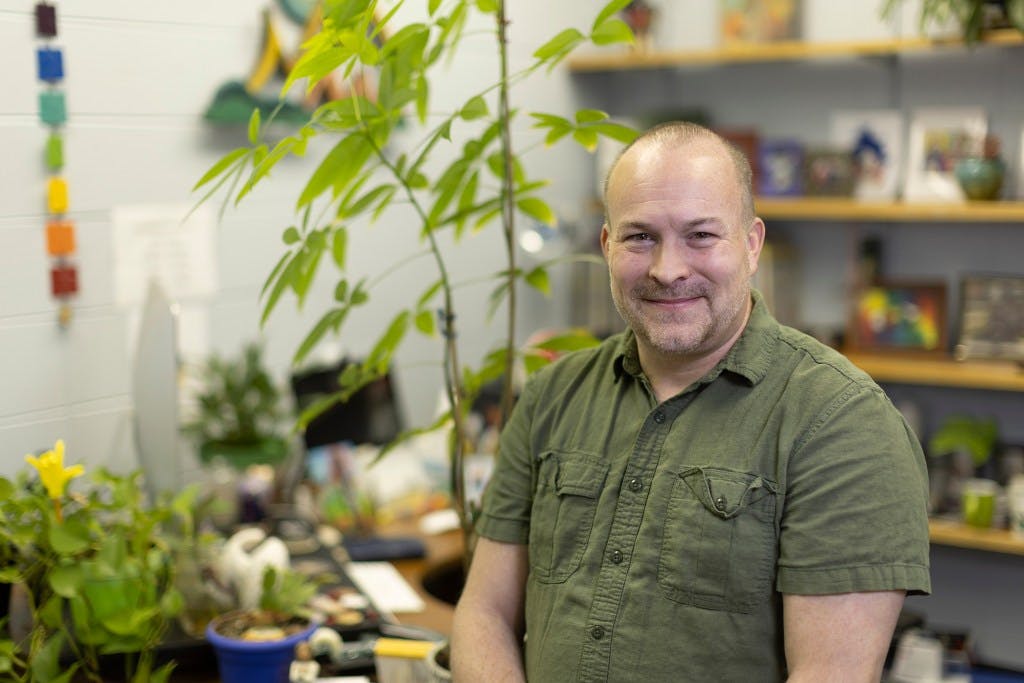With experience working in K-12 schools, interpreting agencies and colleges, Brian Leffler fosters awareness of Deaf culture and identity as a lecturer of American Sign Language at the University of Georgia.
Growing up in a family with both deaf and hearing members, Leffler, who is deaf, learned to communicate by translating between people who speak and people who sign.
 “I grew up in an area where there wasn’t many deaf [people], and so how can I figure out how to do that translation?” Leffler said. “Well, because I was always around a lot of hearing people, yet I utilize ASL, and I was able to see that and have that variation and variety in my life.”
“I grew up in an area where there wasn’t many deaf [people], and so how can I figure out how to do that translation?” Leffler said. “Well, because I was always around a lot of hearing people, yet I utilize ASL, and I was able to see that and have that variation and variety in my life.”
From his family, he also caught the “teacher bug.” Growing up, his mother taught sign language and often brought him with her to school.
“My mom was someone I definitely aspired to be,” he said. “She worked at the high school and would teach in the summer, and often I would look up to her and see her as she was educating.”
His aspiration to teach was further cemented when he attended Gallaudet University, a deaf university in Washington, D.C., where he graduated with a bachelor’s degree in biology. His experience there also solidified his identity as a deaf individual and introduced him to professors he could look up to and a career path he could pursue.
“There were never any deaf universities, or even teachers, in the area that I grew up in originally, so I didn’t have a ton to look up to besides my parents, but at Gallaudet, I knew it could become real—as a deaf individual, I knew I could become a teacher and still aspire and take over those dreams,” he said.
After earning a master’s degree in education, teaching middle and high school science and working at an interpreting agency, Leffler came to UGA in 2013. Now in his 10th year, Leffler has seen growth in the ASL program. Developments over the years include the addition of the ASL minor, as well as an increase in the number of ASL lecturers.
Connected through a shared love of sign language, the Mary Frances Early College of Education’s four ASL lecturers—Leffler, Laurie Achin, Amy Peterson and Debra Teesdale—often partner to create diverse programming and expose students to different situations, such as how to socialize with a hearing person or a deaf person.
“The students in our classes felt like they could really connect with that. There were a lot of different backgrounds, and so we have a basic need of communication, and we were able to connect,” Leffler said. “I do feel that’s where I was also able to become the teacher, and I could really work that K-12 experience and the interpreting experience as a deaf interpreter with my background in hearing culture and spoken language.”
Outside the classroom, Leffler advises ASL Dawgs, an on-campus group that provides education and awareness about ASL and Deaf culture. He is also working toward a Ph.D. in deaf studies at Lamar University in Texas and is on the board of the Georgia Center of the Deaf and Hard of Hearing.
Beyond learning the language, another takeaway Leffler wants students to gain from his classes is the shared humanity and desire for connection between people, regardless of if they are hearing or deaf.
“We inform students that yes, we’re different, there’s diversity, but really, we all have tools for how to connect. Some people use speech, some people use sign language, some people have cochlear implants, but that’s not a boundary, that’s not a line that we’re different,” Leffler said. “We’re all people, and we all desire to have a connection with other people.”